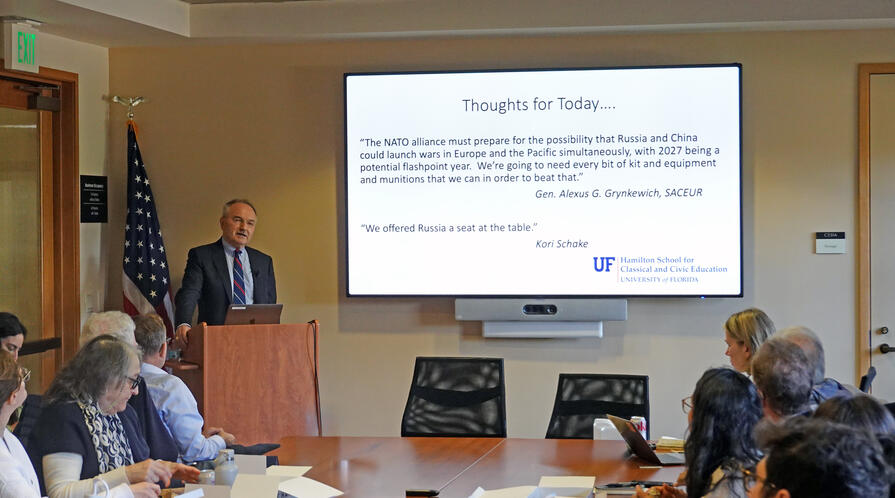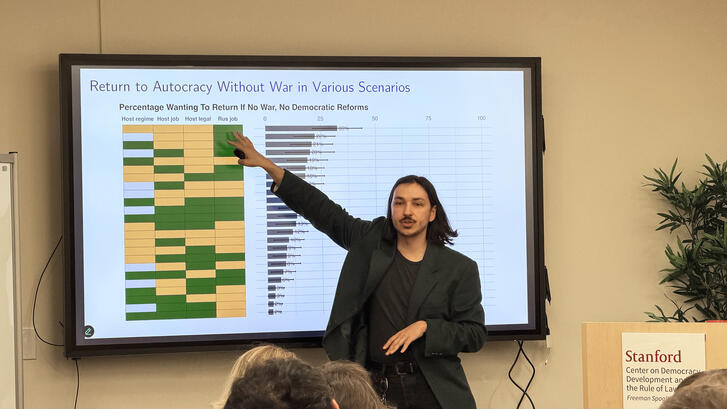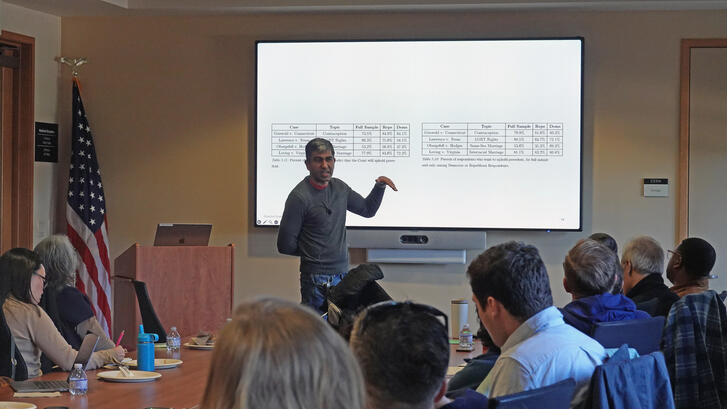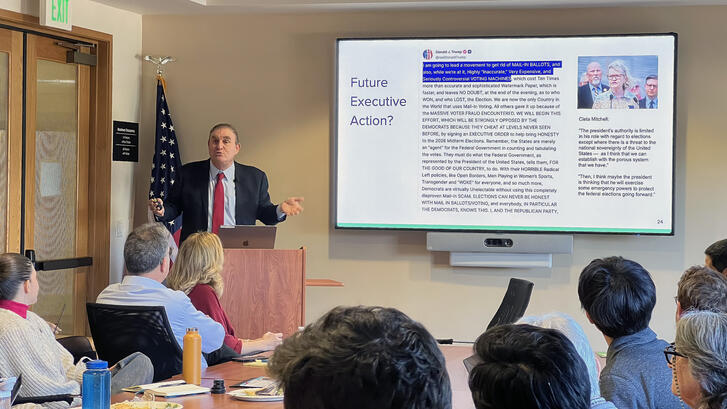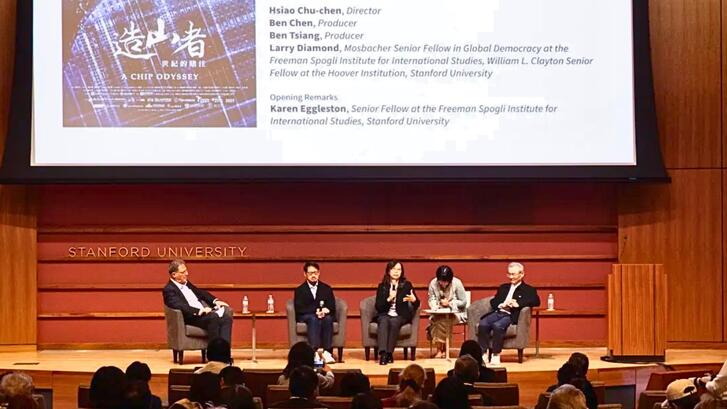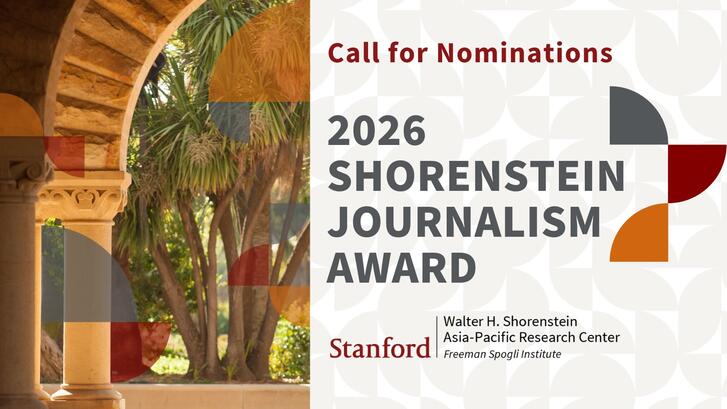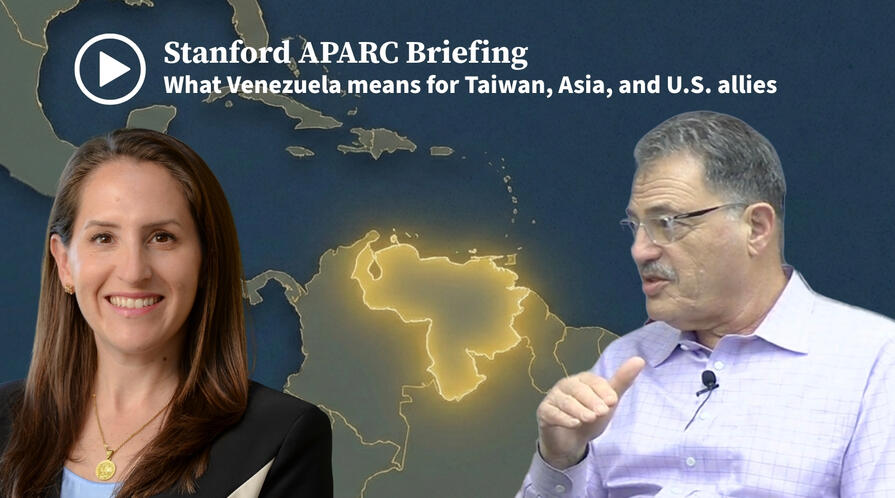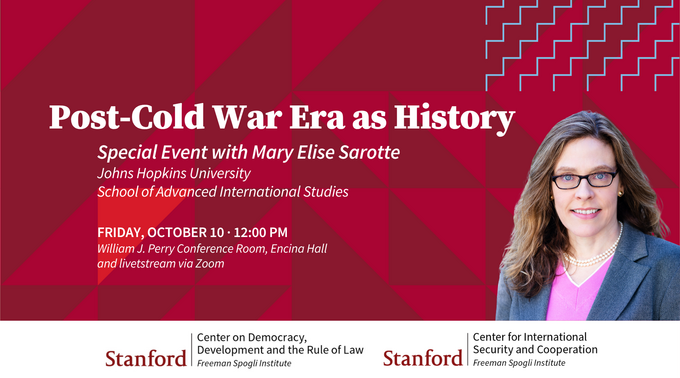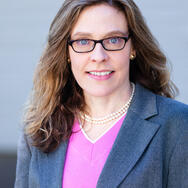TRANSCRIPT:
McFaul: You're listening to World Class from the Freeman Spogli Institute for International Studies at Stanford University. I'm your host, Michael McFaul, the director of FSI. Today I'm joined by Jim Goldgeier, research affiliate both at the Center on Democracy, Development and Rule of Law and the Center on International Security and Cooperation here at FSI.
Jim is also a professor at American University, but most importantly, he's a co-author with Michael McFaul on many things, including a book about U.S. policy towards Russia after the Cold War. He also has written extensively on European security, NATO, Russia, and Ukraine. And given what's going on in the news, Jim, I didn't think there could be a better person to chat about all those things. From when we planned this a couple of weeks ago till today, there's actually been a lot of news.
So why don't we just start with the latest in terms of the negotiations. And then I want to pull back to this broader picture. Really, by the end of our conversation today, I want to know, is there a future for transatlantic security partnerships and the future of NATO? But let's go micro first and then we'll end with that macro. So tell us what's going on as to the best of you can figure it out in terms of these alleged peace negotiations to try to end the war in Ukraine. Tell us what you think is going on and how well you think it's going.
Goldgeier: Well, first of all, thanks for having me on. It's great to be with you and lots of tough issues to talk about, including this one. And I think it's just worth people remembering that, you know, a real negotiation process would be one in which, especially if the United States was really playing a central role in negotiations, in which the US negotiator was going back and forth between the Russian president and the Ukrainian president and trying to figure out how to really resolve some super tough issues, particularly regarding how Russian occupied territory is going to be treated. Even if Ukraine has to accept that for now it can't control that territory, it shouldn't be asked to have to recognize that territory as Russian. And Russia wants, of course, that that territory be recognized as Russian. So a negotiator would be going back and forth. That's not happening.
There isn't a real negotiation. Also in a real negotiation, both sides would be asked to make concessions. Vladimir Putin isn't being asked to make concessions. And he still has the same maximalist goals he had at the beginning of this war. He wants a Ukraine that's basically a subsidiary to Russia. Even if he doesn't conquer the whole thing, he doesn't want it to be independent and sovereign. He doesn't want it to be Western oriented. He wants it under his thumb.
McFaul: Right.
Goldgeier: He wants a new government, a government that he would control. And it would really be incumbent on the United States to explain to him why that's not going to happen. But so far, he hasn't been asked to make concessions, and he also wants Ukraine not to have any military capability to defend itself in the future.
McFaul: So lots of things I want to pull on there if we have time. What do you think the Trump strategy is? Why is he not being asked to make any concessions?
Goldgeier: I think the basic problem comes down to the fact that it just appears that Donald Trump views Ukraine as a nuisance. And he views President Zelensky as a real nuisance. We saw that in the Oval Office meeting. Zelensky's like, you know, we need some security guarantees, otherwise how can we agree to anything? And you know, to Trump, this is all just a nuisance. He wants it to go away. He wants to be able to have a quick victory. I achieved a ceasefire.
Goldgeier: I said I would, I did, and then he can move on to something else. He doesn't care whether Ukraine has peace or not. He doesn't care whether Ukraine's government survives or not. And he has this weird affinity for Putin. We've seen it since 2017 and before. He admires the guy. He wants to hang out with the guy. He wants to do deals with the guy.
McFaul: Right.
Goldgeier: He clearly doesn't want to press him. And so that's not a good recipe for a solution to what is a very serious situation that Russia created.
McFaul: That doesn't sound like a good strategy to me either, I agree. But help Americans understand why it matters. Maybe there are other people that think, well, why do we care about Ukraine? Maybe it is a nuisance, right? What are the bigger interests for America at stake in this negotiation?
Goldgeier: Well, I think we do have to go back to what this country has decided to believe in and support since the end of the Second World War. I mean, we fought a second world war. We fought a war against countries that had used their militaries to go into neighboring countries, take territory that wasn't theirs, and created conflict. That was a big war, a world war.
McFaul: Yeah.
Goldgeier: And we decided at the end of that that we were going to try to create a system internationally that would either prevent those things from happening or impose real costs on countries that try to break that order. And we did that, for example, in 1991 when we went to war against Iraq, which had invaded Kuwait in 1990, and George H.W. Bush put together an international coalition to push the Iraqis out of Kuwait.
And that was something we stood for. We saw it as in our security. And I would argue it is in our security to live in that kind of world. Who wants to live in a world where countries can just go in and take territory from their neighbors, because you don't know whether they're going to keep going. And we have an interest in security and stability in Europe. So when Putin invaded, we supported the government of Ukraine, along with our European allies and other allies as well.
South Korea, for example, which has played a big role in supporting the Ukrainians. And I would say, you know, this is one of the things that's, I would use the word problematic, but it's so far beyond that, about the Trump administration is his own discussion about taking the territory of Greenland, which he said in front of a joint session of Congress, we're gonna take one way or the other. Well, you know.
That's the same thing. You're threatening to use military force to take something that doesn't belong to you. In that case, it belongs to an ally, I mean, a NATO ally. So it's even worse. So, you know, is that the world Americans want to live in? Where powers use military force that way and create the kind of conflicts that led us into a world war previously that was pretty significant for the United States. I don't think Americans want to go through that again.
McFaul: Great explanation. We should study that history so we don't have to repeat it, right? Tell us a little bit about how this is playing in European capitals, these negotiations, right? It was striking to me, for instance, when there was the first meeting with the Russians, Lavrov and Ushakov in Saudi Arabia, and on our side of the table, Secretary Rubio was there, National Security Waltz was there.
But at the other end of the table, there were no Ukrainians, of course. To your point, there's no shuttle diplomacy nor is there direct negotiations. But there were two Saudi officials sitting there. There weren't two Europeans sitting there. How is this playing out as the Europeans observe what is going on, but also are now starting to take actions on their own towards what they might do separately and apart from us vis-à-vis Ukraine?
Goldgeier: It's tough for the Europeans because they are dependent on the United States for their security. They're going to be trying to get out of that situation as best they can because they now, and we can get into that, see that the United States is now an unreliable ally for them. So that puts them in a very different situation than they've been in since the end of the Second World War.
McFaul: Right.
Goldgeier: They don't really have a choice but to stay engaged and to support Ukraine because Putin's Russia remains a threat to them. As long as Vladimir Putin keeps talking about territory that's not his as being subject to potential Russian aggression, they have to worry about what his ambitions might be. They don't really know. They know he has these grand visions of himself as a world historical figure in Russia like Catherine the Great and Peter the Great. And so he's a threat to them. They would love to be able to do this as they had been doing prior to January 20th. They would love to be supporting Ukraine militarily and trying to help it achieve peace that enables Ukraine to remain a sovereign and independent country.
But if they can't do it with the United States, they're going to do everything they can to do it themselves. And so they're going to stand, they're going to help send Ukraine what they can and potentially put troops in Ukraine, although that's a very complicated issue. But they want Ukraine to know that Europe is there for it. And I think they now recognize that they can't count on the United States on this or really much anything else. And so they have to adjust accordingly.
McFaul: And are you impressed by what they're doing collectively or does it seem kind of slow and difficult because you don't have NATO doing this all together? Is the glass half empty or half full, I guess is what I'm asking.
Goldgeier: I think it's half full because I think we just have to accept that they don't have the same capabilities that the United States does. I mean, it's just a fact. They know it. Now they're very aware of it. For example, intelligence capabilities. I mean, this is something the United States has been able to provide to Ukraine. They just don't have the same intelligence capabilities, and that would take them a long time to develop.
They have some defense production capabilities and they're trying to ramp that up as quickly as possible and they're trying to provide what they can. It's not enough, but I am impressed with the urgency that they do feel and the ways in which they're thinking, okay, we can't count on the US anymore. How are we going to take care of our own security in Europe as Europeans? And in that regard, how can we best support Ukraine so that we can stop Putin there so that he doesn't get tempted to do it elsewhere.
McFaul: Let's open the aperture a little bit wider, just talk more generally about transatlantic relations, not just Ukraine. It seems like there's been some pretty big shocks to this relationship. I'm thinking first and foremost about the speech that Vice President Vance gave at the Munich Security Conference, where he lectured all the Europeans about how badly they're doing with their practice of democracy. There's then been the tariffs, of course, and there's been hints that we might be pulling our troops back. You can update us as to whether that's real or not, but give us your update on transatlantic relations in the first hundred days of the Trump administration.
Goldgeier: So JD Vance, his speech in Europe at the Munich Security Conference, also his efforts on behalf of the far right AFD party in Germany interfering in the German elections to support an extremist party, was definitely a wake up call for the Europeans. I think even more than what we're seeing with respect to Ukraine, this was a sign that the United States is not an ally anymore. Donald Trump treats the European Union as an adversary. He talks about how it was created to screw over the United States. By the way, the United States was strongly supportive of building a more united Europe. That was true for post-war presidents who thought it would be great for Europe to be more united as a partner with the United States.
McFaul: And that turned out to be true, right? I mean, that was a pretty good investment.
Goldgeier: It was true. It's been true. Great trading partners, great military partners. They're great partners. And now we're telling them, you know what, we don't see you as a partner anymore.
McFaul: Right.
Goldgeier: First Trump term, the Europeans sort of tried to just tell themselves they would just get through those four years, hoping things didn't go hugely terribly and that they could get through it. And they did.
And I think a lot of them with Trump winning this second time in 2024 thought initially, okay, maybe we could just get through these four years again. And I think now they're recognizing that this is just a different situation, the kinds of people that Trump had around him as advisors, as national security advisors, as secretaries of defense, they don't have that, you know, what were termed adults in the room in the first Trump administration. He's unleashed. He clearly hates Europe. I mean, I just think this is just a longstanding belief he has that they've taken advantage of the US. He's treating them as an adversary.
The tariff situation is, I think, the most serious because it's basically telling the Europeans, we're going to make it harder for you to trade with the US. And what that's going to do is cause the Europeans, as they're currently doing, to look elsewhere. I mean, this is the general problem for US foreign policy right now is, you know, nobody likes a bully. He is a bully. But other countries have to pursue their interests. So if they can't do that in concert with the United States, they're going to figure out other ways to do it.
The trade agreement that was the Trans-Pacific Partnership that Trump walked away from in his first term, well, the other countries in that TPP reformed it as a different entity. And Europe now is interested in figuring out how to get in. Europe's interested in figuring out with Australia how to form a free trade agreement.
Goldgeier: They're actively looking elsewhere…
McFaul: Without us involved, right?
Goldgeier: …without us, because they can't count on us and they don't know. You know, he put 25 % tariffs on steel and aluminum. He's got 10 % tariffs worldwide. There's a possibility he's going to go up to 20% with Europe. They don't know. He's unreliable, he's unpredictable, and they have got to start making other calculations. And so they're going to do that.
McFaul: That's sobering. And on the military side too, tell us a little bit about what you see happening within NATO and other conversations of European security architecture outside of or next to NATO.
Goldgeier: I think the two really big issues for us to watch and think about, one is Europe's own defense production. In the world we've lived in, Europe could buy military equipment from the United States. You want F-16s, you want F-35s, you can buy from the US. Europeans now are thinking, all right, we don't want to do that anymore. American defense companies are going to lose through this because the Europeans don't want to put themselves into that dependence situation anymore. So they are developing their own systems. And while that will take time, these are rich economies. They've got technological capabilities. A lot of it's going to be whether or not countries can work together in terms of developing new fighter aircraft, which they've already started doing and they're starting to...
McFaul: The Europeans have?
Goldgeier: The Europeans are doing this. They're finding markets in the Middle East, for example. I think this is going to be bad for the United States. And I would think Lockheed Martin and Boeing and others are going to the Trump administration and saying, this isn't going to be good for us. So that's one thing to watch, just that defense production. And then the other, as you were just mentioning, is institutionally, how does Europe do this?
McFaul: Yeah.
Goldgeier: You know, NATO has existed all this time since 1949 with the United States as its undisputed leader. The United States has been the major power in Europe. There's always been an American who's been the supreme allied commander in Europe, the SACUR. This is the military official who oversees the military operations for NATO and that person has always been an American. With the Trump administration, there's been grumblings about maybe not wanting to do that anymore.
We don't know whether Trump really would fully withdraw from NATO or whether the United States would just have less of a presence and I think the real question and I don't know the answer to it is, can NATO function without that US leadership? Can the other countries of NATO, there are 32 countries in NATO, can they work together within that organization that's been set up without the United States having much of a presence? I mean, we haven't been in that situation before, so we just don't know.
I mean, the European Union isn't really set up to do what NATO does. So I think it's still a hugely open question. And I believe we will see lots of sessions at think tanks in America and in Europe on the future of European security and re-imagining European security and trying to understand this. It's just uncharted waters.
McFaul: Right. Say a little bit, again, in the same question I had about Ukraine. So why should Americans care, right? Europeans haven't been spending much on defense, as you alluded to. I think we agree they probably should have been doing more. And maybe had we started that conversation earlier, we wouldn't be here. I'm not convinced of that, but some people make that argument.
There's a more extreme argument that you hear from Trump administration officials and Trump himself is like, let the Europeans take care of Europe. We got to take care of Asia. Putin, that's their problem. What's the downside of the breakdown or weakening of NATO from America's national interests?
Goldgeier: I'd say two things to that. One is just that… Of course, Europeans have been spending more and of course they should have been spending even more. And I do think Joe Biden was wrong. The first thing he said when he came back in was, to the Europeans, America is back. Which basically led many of them to think, okay, phew, we don't actually have to do a lot more. When we should have taken those four years to really put this on a better path because I think the United States should have less of a presence in Europe.
They are rich countries. We don't have to do everything for them as we have in the past. They know, they should know that by now, but we should do it in partnership with them. We could still be partners with them, even if we're doing less.
McFaul: And why is that important from your perspective in terms of America's national interests? That partnership versus just go at it alone. We'll be in charge of North America. They'll be in charge of Europe. What's wrong with that kind of thinking?
Goldgeier: You never know when you're going to need your friends. So I think it's good to have friends. I mean, one of things that's been an advantage for the United States in the world compared to countries like Russia and China is we have lots of friends. We have allies. They're there for us. When we asked them to join us in Afghanistan, they were there. They came. A lot of them lost lives, had troops that were killed.
And the other thing is, actions in one part of the world have implications in others. There's a reason in the last three summits that the countries, the so-called Indo-Pacific Four, Japan, South Korea, Australia, and New Zealand, the heads of state and government from those four have come to the NATO summits the last three years and presumably are coming to the one this summer. They see these linkages. They see the importance of Ukraine. South Korea has been providing artillery to Ukraine because they don't want Putin to succeed in Ukraine because they don't want to see the signal that will send to Xi Jinping regarding Taiwan and regarding potential Chinese aggression more broadly in the Western Pacific.
So, countries are definitely watching. And I just think from a U.S. perspective — and I do think most Americans understand this — it is good to have friends. We have good, strong friends who've been with us and we can explain why they're gonna need to do more and I think the Europeans have gotten the message and are gonna try to do more, but it should be with us and not against us. Why do we need them as an adversary? We already have other adversaries.
McFaul: Yeah. We have serious adversaries.
Goldgeier: We don't need to make our best friends adversaries.
McFaul: And wasn't it Churchill who said, or I'm paraphrasing the word, the only thing worse than going to war is going to war alone? I think he's said something along those lines.
Goldgeier: Right. Yeah.
McFaul: So Jim, last question. Tell us about the future. Speculate a little bit about, is this the end or, and just maybe focus on NATO, because we don't have time to talk about all the institutions, or if they survive and muddle along for the next four years, is there a possibility of renewal of these transatlantic security relationships, a renewal of the NATO alliance?
Goldgeier: Well, I hope we could renew a transatlantic partnership between the United States and Europe. The problem is the Europeans now know that the United States is not reliable. We had Trump one, we had Joe Biden, we had Trump two. They can't keep bouncing back and forth. If we have another president like Joe Biden after Donald Trump, who wants to rebuild things with Europe, they still have to be thinking, okay, we don't know what's gonna happen four years later. Is J.D. Vance going to come and start yelling at us, talking about how pathetic we are as he did in the signal chat? I mean, in my view, NATO as a collective defense organization that at its core has the United States there to help defend the member states. I don't believe the Europeans can count on the United States in the future to defend them.
And I think that given that that is the core of NATO, I think NATO as we've known it is finished. What NATO can be, the different thing it can be, more European organization, less US, we don't know how that's gonna play out. But as an organization where the United States was fundamentally there and saying, we are with you in collective defense, I think they know Donald Trump's not going to defend any country in Europe. And they don't know whether a future president would or wouldn't. And so I think they have to adjust accordingly.
McFaul: Well, we can't end on that sobering note. Give us one piece of hope for the future of transatlantic relations, US-European relations, long term, even if you have to go way into the future.
Goldgeier: Well, I think long term Americans and Europeans will still want to, I mean, as peoples, I think the peoples will still want to be partners with each other. So it's just getting the governments back to reflect what the populations would like to see.
McFaul: Okay, we can’t end on that horrible end note that the feature is over. I think the thing you had is really true. I think that our societies are connected and we have shared values. We're part of a democratic world and you and I travel to Europe all the time and they want that connection. I think that's a thing that the Trump world sometimes wants us to convince the world that nobody wants America. That's definitely not my feeling when I travel. And in Asia too, by the way. I would say they want an American presence. So that gives us something to chew on and work on in the future.
Jim, thanks for being on World Class. Great to have you.
Goldgeier: Thanks for having me.
McFaul: You've been listening to World Class from the Freeman Spogli Institute for International Studies at Stanford University. If you like what you're hearing, please leave us a review and be sure to subscribe on Apple, Spotify, or wherever you get your podcasts to stay up to date on what's happening in the world, and why.
